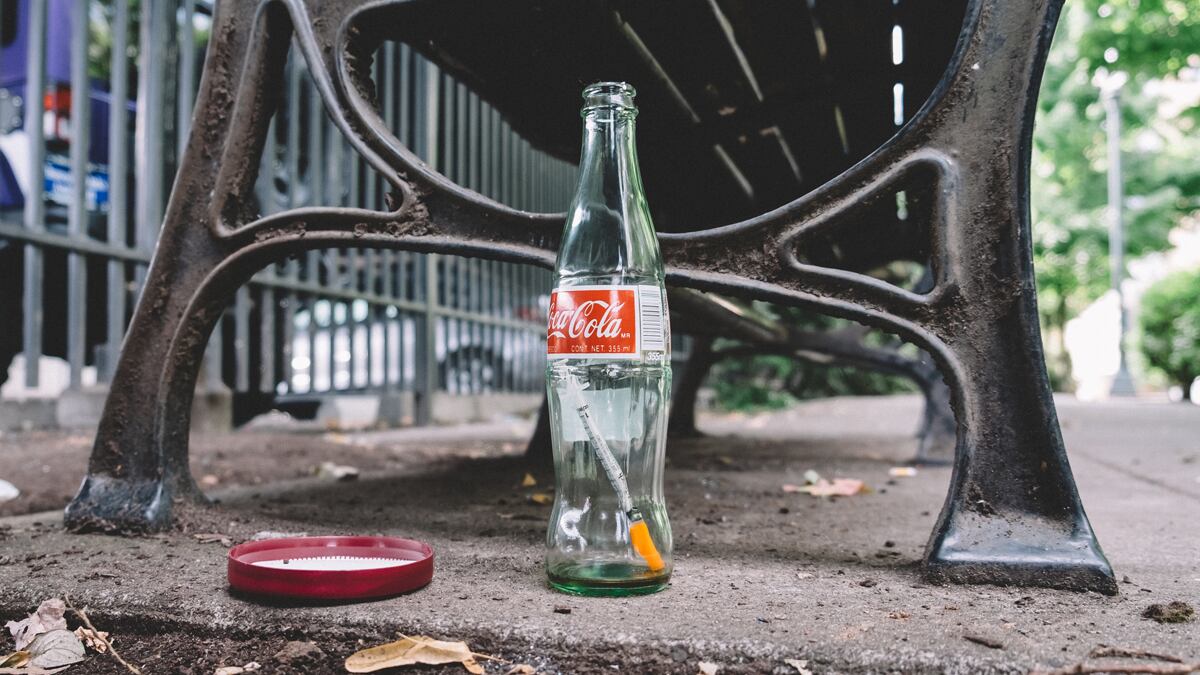When he was homeless for 13 years along the Springwater Corridor Trail, Jeff Nelson used methamphetamine daily. Another man, who calls himself Gadget and lives on the streets of inner Southeast Portland, says he uses it once a day.
Why meth? Both men see the drug as a weapon in the three-season fight against Portland's bone-chilling damp.
"It's the antifreeze," Gadget says.
"To be serious, it kept us alive, because when there was no place to sleep, you'd walk around all night to keep warm," Nelson recalls. "Heroin is a fucking bad epidemic, but out there on the trail, [it] was meth."
Much of Oregon's recent policy conversation about drug abuse has focused on opioid use by people on the margins—especially after Multnomah County filed suit this month against several major pharmaceutical companies for peddling pain pills. Yet in interviews during the past year with roughly 100 houseless people living in camps and on Portland streets, the drug they bring up most frequently is one that was far more notorious a decade ago: meth.
Timothy Ferrell, who lives in a tent outside St. Francis of Assisi Catholic Church, says meth is more valuable than money on the street. "You can buy anything with a $20 bag of meth," he says. "It freely flows here, in this town."

Meth represents the "greatest threat" to Oregon from an illicit drug, according to a June report by the local affiliate of the Office of National Drug Control Policy. It was the drug most seized by Portland police last year by weight: 77,615 grams, versus 51,179 grams of heroin, which ranked second.
"There's no doubt that meth is spiking, and broadly," says Dwight Holton, executive director of Lines for Life, a substance abuse and suicide prevention nonprofit. Holton, along with half a dozen others in social services and government, says he doesn't have specific figures for drug abuse among Portland's homeless.
Several homeless people tell WW that meth provides a defense against two of the greatest stressors that come with being houseless: despondency and fear. It replaces those feelings with a jolt of energy and a sense of invincibility—like getting a double espresso spiked with Xanax.
Gadget and his girlfriend compared meth to a Dutch Bros. beverage called "ER 911"—a cup of coffee plus four shots of espresso.
"Shit gets done," says Gadget, who said his given name is Josh. "Otherwise, I don't want to go anywhere and do anything."
After smoking meth, Gadget says he'll take apart and repair headlights, portable chargers and cellphones. He uses meth with cannabis, and enjoys the "up and down, up and down" feeling—"it's like, whee!"

Others agree meth helps them stay focused and carry out the repetitive tasks of life on the street: moving camp, jump-starting a car, collecting cans.
Yet that energy is often counterproductive.
"You've heard of people tweaking, and they're busy doing things that make no difference in the grand scheme of things," says Pat Rogers, who manages housing and homeless services for Community Action of Washington County. "I knew a lady that decided to paint all the grout in her bathroom black, with a tiny paintbrush."
Rogers overcame meth addiction and homelessness to become a certified alcohol and drug counselor.
"As a meth user, I didn't get the heroin user's desire to drop out," Rogers recalls. "I liked having that artificial enthusiasm about my day. What would seem horrendous to most people seems perfectly fine."
There's another, more practical issue for street-level drug users: aversion to being poked. "I smoke [meth] and eat it," Gadget says. "I don't use needles."

Outside St. Francis, Ferrell says sleep can be a "safety issue" for unsheltered houseless people, because lack of physical refuge leaves one vulnerable to attack. Some use meth to stay awake at night, preferring to sleep during safer daylight hours. It's one of the ways homelessness leads to addiction, and vice versa.
"It's hard to be sober and homeless," says Kevin K., waiting for his laundry outside the Transition Projects Day Center in Bud Clark Commons on Aug 4. "It's easy to be high and homeless, but when you're sober, you're alone out here. If I'm high, I got 30, 40, 50 friends."
He'd been in Portland just 10 days but had been offered both meth and heroin many times, he says. "These people are doing meth and heroin all day long around here," he adds, nodding at a dozen people sitting or lying nearby.

For many observers, it's impossible to discern drug use from unmanaged mental illness. Indeed, people using meth often report being driven to the brink of madness. Kevin K., who lives in Old Town/Chinatown, says meth introduced him to the "Shadow People"—hallucinatory figures that hovered at his peripheral consciousness, or pursued him.
"You stay up five, six days—next thing you know, there's someone next to you," he recalls. "I had the FBI chasing me. I actually climbed up a tree and sat there for eight hours. I have 400, 500 pictures of a white car I was convinced was following me.
"I sobered up," he recalls, "and they all had different license plates."

Nelson, who used meth for all of his 13 years along the Springwater Corridor Trail, won $1,300 in a settlement with the Oregon Department of Transportation after workers threw away his tent, sleeping bag and other possessions. He used it to pay the security deposit on a cheap studio apartment in Northwest Portland, where he still lives.
These days, Nelson holds down a job, and leaves meth alone. On a warm July night at the Nob Hill Bar & Grill, he lent a marijuana pipe to a homeless friend while nursing a Budweiser tallboy.
Then he reminisced about his own time on the streets, when meth provided "drive."
"I had to use meth to stay awake and alive," Nelson says. "Because you got to keep going, all the time."
Down and Out in Portland, Oregon is a weekly column that answers the city's most pressing questions about homelessness by taking them to the people who know the issue best: those living on the streets. Look for a new installment weekly throughout the summer.


